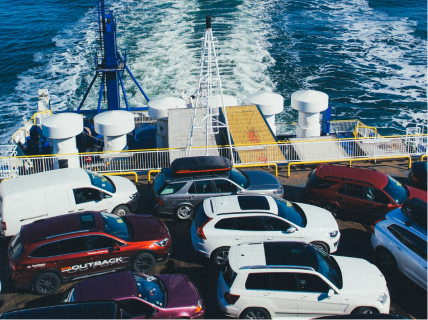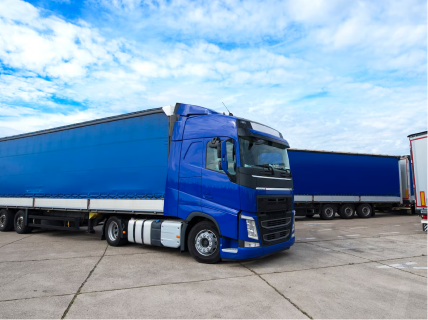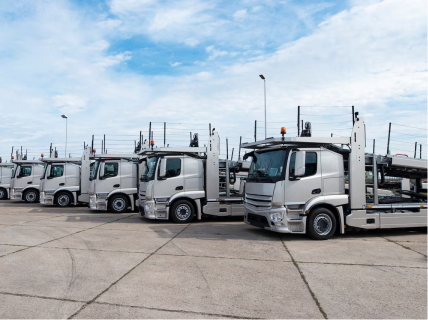How do shipping fishing boats works?
 Book online
Book online
 Pickup
Pickup
 Boat shipping
Boat shipping
 Delivery
Delivery
Fishing Boats Transportation from a state to state
Boat transport costs vary based on distance, boat size, and handling requirements. Typically, it costs between $1 and $2 per mile, but larger boats or those requiring special handling may cost upwards of $3 per mile. Short distances may cost $160 to $350, while long hauls can cost $650 to $1,500.
We are the best Boat Transport Company in the US.

Shipping A Boat To Florida?
Transport Fishing Boats Nationwide
Boat shipping is a crucial aspect if you want to relocate your boat or yacht to a different location. At We Will Transport It, we provide our clients with a practical solution to address their shipping needs.
Our company takes pride in delivering exceptional boat transportation services. We ensure quality, safety, reliability, experience, and a thorough evaluation of your boat both before and after offloading and loading. We specialize in transporting fishing boats, making us your go-to option for such services.
Boat transportation is a convenient and valuable service for all boat and yacht owners. However, choosing a suitable transporter requires thorough research and a proper understanding of the transporter’s policies and regulations. If you’re looking to transport a fishing boat, we’ve got you covered. Here’s what you need to know before you decide to transport your fishing boat.
There are several ways to transport a fishing boat, including:
- Trailering: If you need to transport a boat overland, the most common method is to use a trailer that you can either buy or rent. Depending on the size of the boat, it can be hauled by a car or a truck. Smaller ships like kayaks or canoes can be transported simply on top of a trailer or car. This is a convenient and affordable way to move your boat from one place to another without having to worry about waterways.
- By water on keel: Navigable waterways serve as a crucial means of transportation for boats, enabling them to travel from one location to another with ease and efficiency. These waterways are essential for businesses and industries that rely on water transport, as they provide a reliable and cost-effective method of moving goods and materials across long distances. Moreover, navigable waterways have played a vital role in the development of many communities, facilitating trade and commerce and contributing to economic growth. It is essential to recognize the importance of these waterways and to ensure their continued maintenance and preservation for future generations.
- By land: When it comes to transporting larger boats, there are two primary methods to consider. The first is to use trucks to transport the boat over land. The second method involves transporting the ship via water using specialized vessels explicitly designed for transportation purposes. It depends on the size and type of boat, as well as the distance and terrain of the transportation route.
- By air: It is feasible to transport a watercraft by air. This method of transportation can be beneficial in situations where time is of the essence or when the boat needs to be moved far away by land or sea. However, it is crucial to consider the size and weight of the vessel, the capabilities of the aircraft, and the logistics involved in the operation. A successful and secure transport also requires compliance with all relevant regulations and safety standards.
Fishing Boats | The different kinds of fishing boats include:
Bass Boats
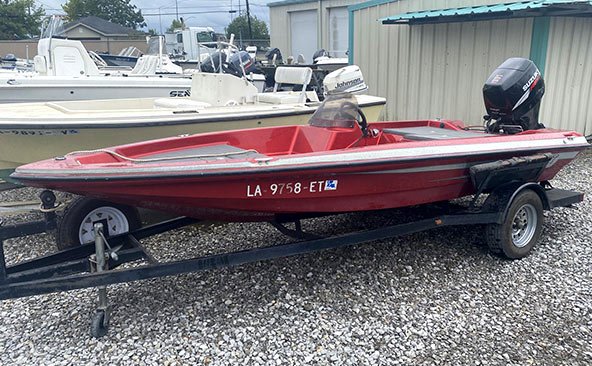
A small boat that is specially equipped and designed for bass or panfish shipping is typically used in freshwater, such as lakes, streams, and rivers. This type of boat, also known as a contemporary bass boat, comes with swivel chairs that allow anglers to cast from any position around the vessel. It also features storage bins and equipment, such as lures and rods, to make fishing more convenient and enjoyable.
Bass boats are typically equipped with both an outboard and a trolling motor. The outboard motor is designed to provide rapid movement of the vessel from one location to another. In contrast, the trolling motor allows an angler to move slowly and quietly through the water while fishing.
Center Console
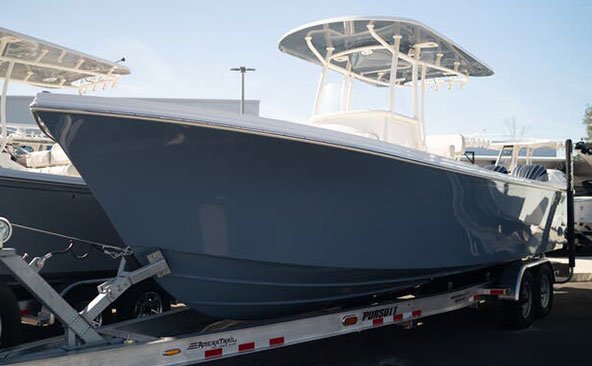
These boats are named after their central steering console. They are capable of handling rougher waters offshore and are ideal for ocean fishing.
If you are planning to sail in offshore waters where sea and weather conditions can be challenging, choosing a seaworthy vessel is of utmost importance. In such situations, boats with deep V-bottoms are the perfect option. They can handle huge waves and ocean swells with ease, providing a smooth and safe ride. These boats come with a range of amenities, such as large insulated lockers, multiple rod holders, and tackle storage, to ensure a comfortable and hassle-free fishing experience.
Sport Fishing

If you’re an avid fisherman looking to catch larger fish, consider opting for larger vessels. These boats offer ample space and amenities that can make your fishing trips comfortable and enjoyable, even if they last for a long time. Moreover, larger vessels can venture offshore, and they come equipped with towers, outriggers, and multiple rod holders, which makes them an ideal choice for catching big-game fish like marlin, tuna, and sailfish. So, if you’re looking for a thrilling fishing experience, a larger vessel can be your perfect match.
Aluminum Boats
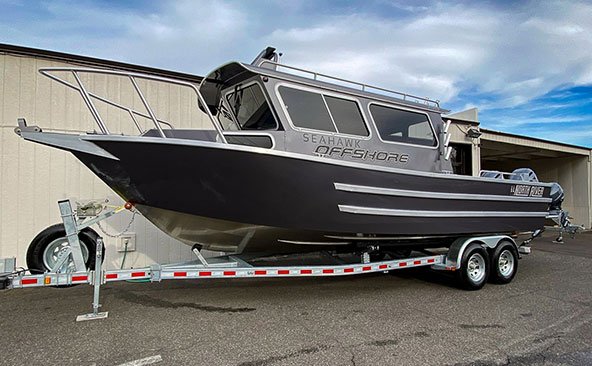
Smaller boats characterized by welded or riveted aluminum hulls predominantly cater to freshwater fishing requirements. The boats are designed with simplicity and lightweight construction, making them ideal for inlets, shallow water, and areas that are inaccessible to larger vessels. With their compact size, these boats offer a versatile and practical solution to fishing enthusiasts who require maneuverability and portability.
Factors to Consider When Looking for a Fishing Boat Transporter
-
Authority
Any legal carrier must have authorization from the Federal DOT and Federal Motor Carrier Authority, indicated by numbers in the carrier’s profile information.
-
Insurance
When transporting your boat, it’s essential to know that your regular boat insurance may not cover any damages that occur during transportation. To ensure that your vessel is protected, make sure that the carrier provides cargo insurance since more than basic liability coverage is needed. It’s always a good idea to ask about purchasing additional coverage to guarantee the safety of your boat during transport.
-
Tracking
It is important to ask potential transporters about their tracking options so you can monitor your shipment. Effective communication is also a hallmark of the best carriers.
-
Feedback
It is crucial that you carefully review a transporter’s track record and references before selecting their services. You can check the carrier’s feedback rating, history, and comments on their profile. Additionally, you can verify their background by visiting BBB.org for complaints filed against the transporter. Fortunately, you can find our excellent average rating online.
Obtaining the Best Boat Shipping Quote
If you’re looking to transport a fishing boat, it’s essential to get the best possible quote. To do this, it’s recommended that you gather multiple quotes from different transport companies. The cost of transportation depends on several factors, such as the boat’s origin and destination, its measurements, and the desired dates of transport. Providing this information, along with the model and make of your boat, will enable the transporter to give you a more accurate quote.
After obtaining a quote for boat transportation, it is essential to inquire from the carrier how they arrived at the quote. The quote should include all costs, such as tolls, permit fees, and gas. It is advisable to take your time to shop around for reasonable rates, but always prioritize quality over a lower price.
It is essential to avoid transporters who cut corners by omitting cargo insurance or necessary permits for your boat. However, as a shipper, you can influence the price of your shipment by being flexible during the process. Some transporters may offer lower quotes when given some flexibility.
The best way to save money on boat transportation is to be prepared throughout the entire process. The easier it is for the carrier to haul your vessel, the more money you save. Look for trustworthy companies that offer cheaper options but always prioritize safety, service, and security. Good communication with the hauler will ensure a positive experience for both parties.
Whether it’s a speedboat, fishing boat, or yacht, boat shipping needs special handling and meticulous care during transportation. We’re experts at shipping vessels safely and without damage, so contact us today for quality services.
Suggested links:
- Tank Transport Service
- Transporting Your Fishing Boat
- Fishing Boat Shipping
- 6 Major Types of Hauling Equipment
- Boat Transport Fort Myers
FAQs
What is the process of boat transportation?
Transporting a boat from one location to another, whether by land, sea, or air, is commonly known as boat transportation or hauling. For road transportation, boats are usually towed behind a vehicle, but some specialized vehicles are available designed for this purpose. It’s essential to ensure that the boat is transported safely and securely, and the necessary precautions should be taken to avoid any damage during transportation.
What is the best way to prepare a boat for transport?
It is essential to drain water tanks and bilges, switch off water, gas, electric, and fuel supplies, and remove hazardous or flammable materials. Tenders on davits and outboards on brackets should ideally be stowed below the deck.
Is it possible to ship a boat without a trailer?
If you need to ship a boat but need a trailer, you should reach out to your carrier to inquire about alternative shipping options. Some boat shipping companies, such as TGAL, offer trailer rental services. It is recommended that you research different shipping companies to find out which ones provide boat trailer transport services.
A 40-foot boat can weigh up to 4,000 pounds, so how much does it cost to move it?
The average cost for transporting a 40-foot boat via road ranges between $2.75 and $3.75 per mile. Shipping, on the other hand, costs between $1 and $3 per mile for distances less than 1,000 miles. Crewing a boat can be a more cost-effective option, with the cost per mile ranging from $0 to $1.50. However, choosing this option requires more time and effort.
Can I trailer a 24-foot boat?
Our standard aluminum trailers can accommodate most shaft-drive boats up to 24 feet in length. However, if you have a V-drive boat, you need to ensure that the rear of the trailer is strong enough to support the additional weight of the engine at the back. This is an important consideration to ensure your boat and trailer stay safe on the road.
Recent Boat Transport jobs by We Will Transport It
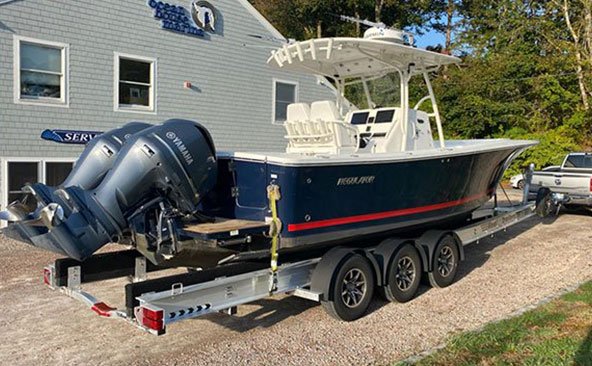
Regulator fishing boat was transported from Florida to California
A regulator fishing boat was transported from Miami, Florida, to San Diego, California. The ship was already on a trailer, and it was pulled by a 2016 Dodge Ram 3500 heavy-duty diesel. The transit time for the journey was two five, and the driver charged $2.50 per mile for the transportation.
